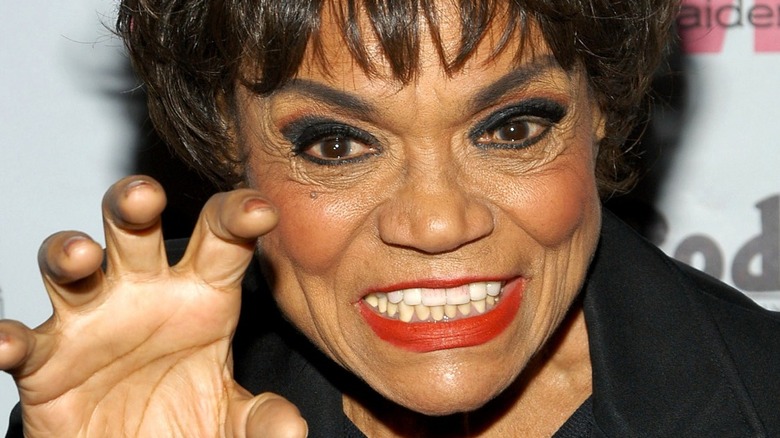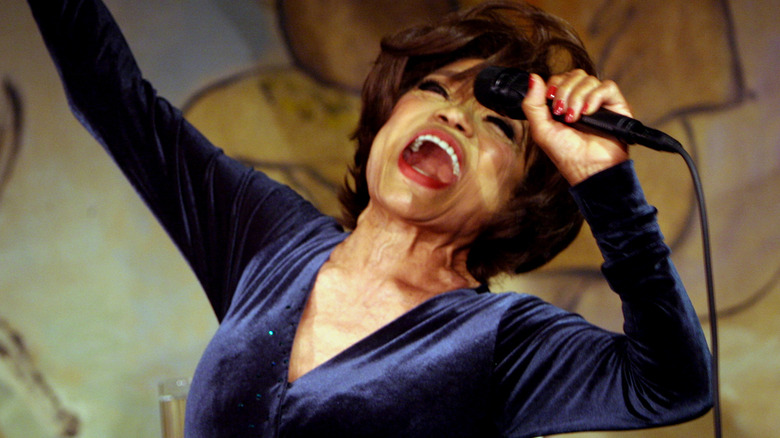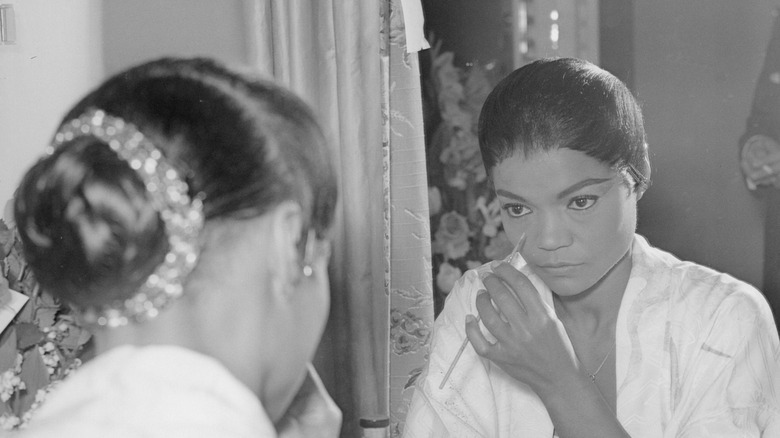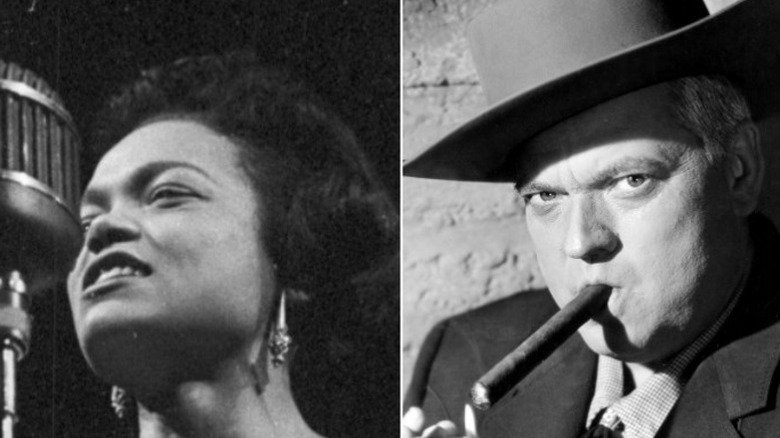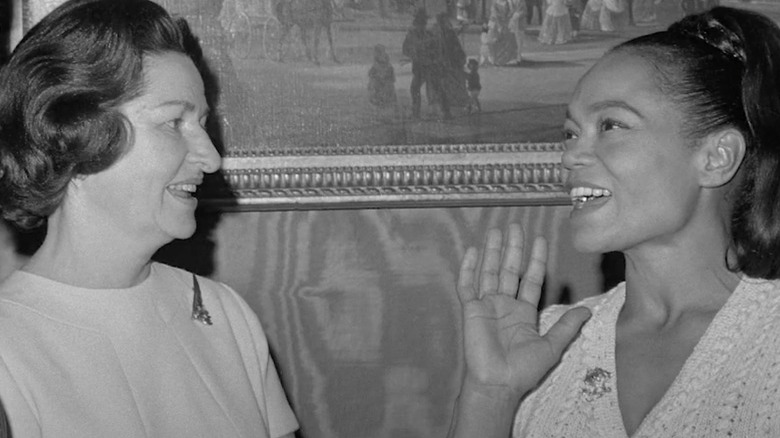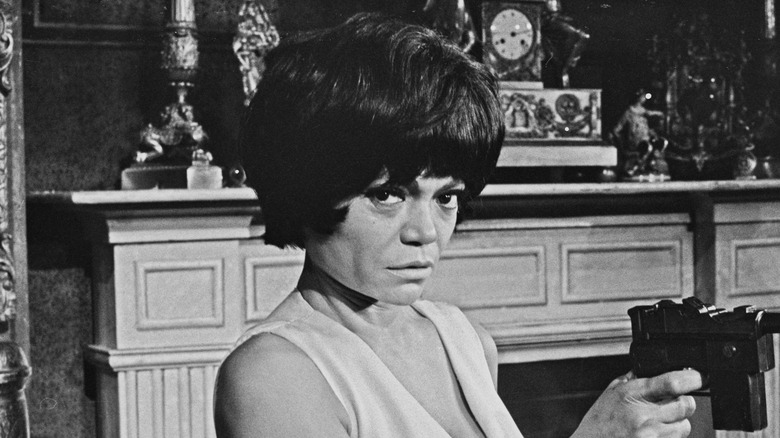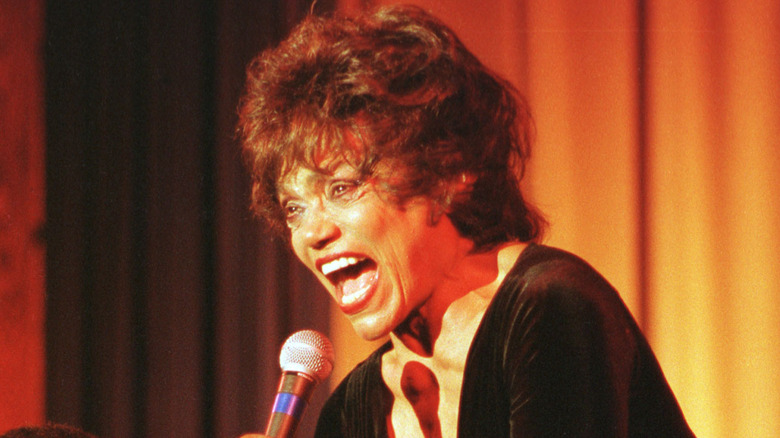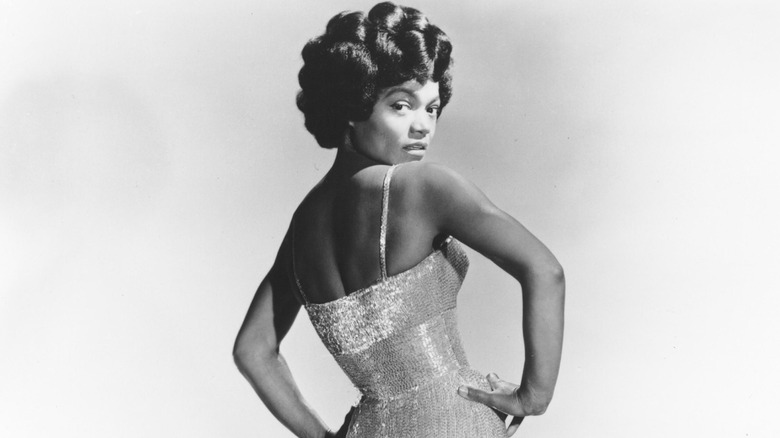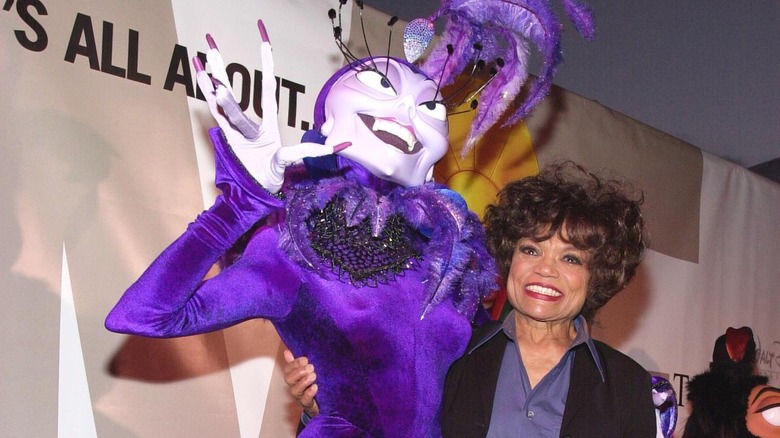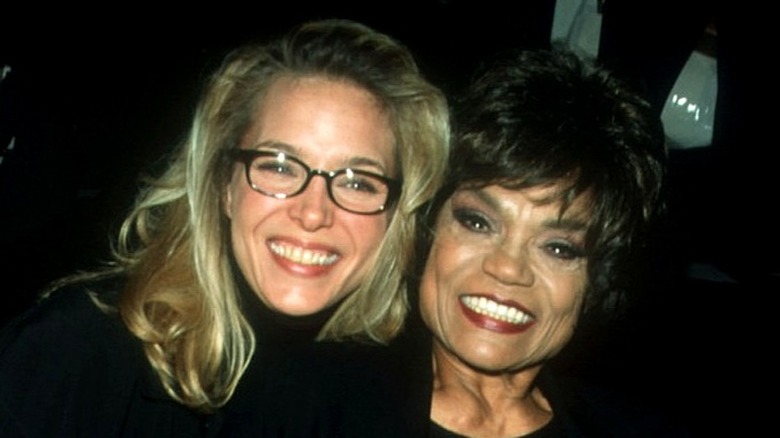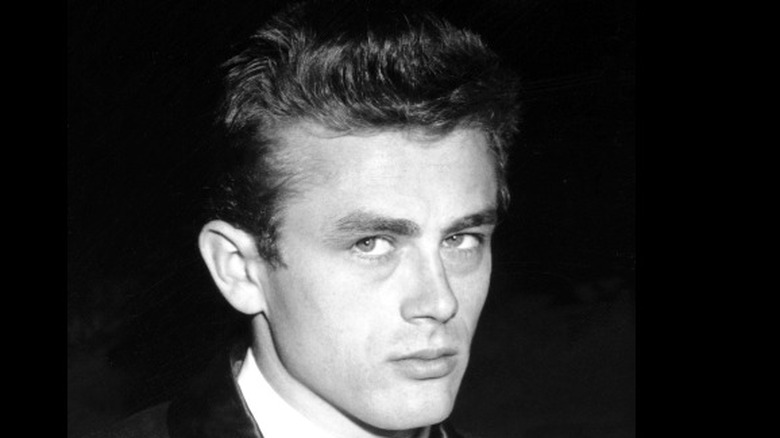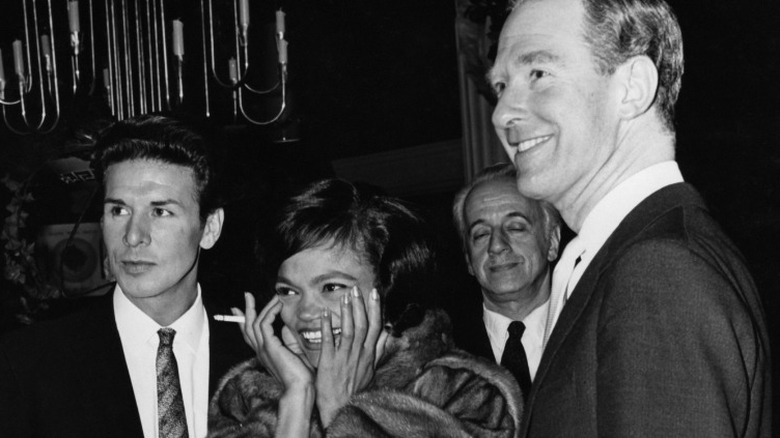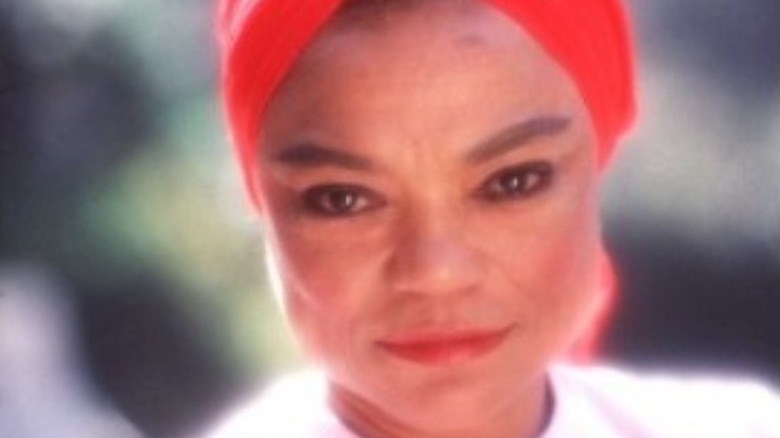The Untold Truth Of Eartha Kitt
Eartha Kitt had an iconic voice of the ages. She was the epitome of classy elegance and sex-positivity. Her career spanned over six decades, and she was nominated for numerous awards, including three Tonys, two Emmys, and two Grammys, according to her official website.
Her life was a classic story of rags to riches. She rose to fame from her humble roots as a cotton picker from South Carolina to an international entertainer. Kitt was a cabaret singer, a dancer who has performed on Broadway, and was an influential Hollywood star. Behind her devilish good looks and flirtatious purr lies a life peppered with tragedies and triumphs. Here is the untold truth of Eartha Kitt.
Her mother abandoned her as a child
Eartha Kitt had anything but a happy childhood. Her mother, Annie Mae Keith, gave birth to her on a cotton plantation in South Carolina but abandoned her at a young age. According to The Guardian, her mother's new husband had refused to raise Kitt due to her lighter complexion. Kitt was the result of an affair between her mother and an unknown white man (a serious taboo in the segregated Deep South in the 1920s).
Kitt was given away to her Aunt Rosa, who proceeded to mistreat and abuse her for several years until her mother's death. The Guardian reports her Aunt Rosa made her work in cotton fields before shipping her off to a different relative in New York when, as her official website notes, she was around 8 years old.
She died never learning her father's identity
Eartha Kitt never met her biological father. It was suspected that he was a white man who was a local doctor in South Carolina where she was born, reports the Guardian.
Her daughter, Kitt Shapiro, explained how this missing piece of her identity was a great source of pain and shaped her connection with the South.
Shapiro told the Guardian, "In 1927, to be a light-skinned black person in the South was just as horrible as being a black person in the white South. My mother was not accepted by the black community."
Kitt's journey towards self-discovery came after she returned to South Carolina for a speaking engagement at Benedict College in 1997. According to the Guardian, the students did some research into the star's past. It eventually set Kitt on the path to battling with the courts for access to her birth certificate.
According to Shapiro, they spent nearly six months petitioning the courts. At age 71, when she finally did obtain the document, she was dismayed to find his name was redacted. She died 10 years later without ever finding a name.
Orson Welles helped her break into Hollywood
After making a name for herself in the 1940s with the Kathrine Dunham dance troupe (via Britannica), Eartha Kitt branched out on her own. She was a star performer in the popular Paris nightclub, Le Carroll, for a time. As per Wellesnet.com, Orson Welles discovered her talent after attending one of her shows. The timing could not have been more perfect as the singer was entering a dark period of low employment.
Welles cast her as Helen of Troy in his "An Evening with Orson Welles" in 1950. Kitt, of course, stole the show and received a glowing review from Stars and Stripes, raving at her rendition of Duke Ellington's "Hungry Little Trouble." Welles and Kitt would grow close in their time performing together –- but it was strictly a platonic romance. In her autobiography, "Confessions of a Sex Kitten," she wrote about how Welles would spoil her with lavish dining experiences and recite Shakespeare to her (via Vanity Fair).
It's easy to see why she and Welles were rumored to have been lovers. However, according to Vanity Fair, Kitt said of the relationship, "Maybe this is why Orson said I was the most exciting woman in the world, as he was never given a chance to find out how unexciting I might have been in bed." The world will never know if the two truly were intimate, but judging how Welles fawned over her, it was probably the most romantic platonic relationship among their contemporaries.
Eartha Kitt brought Lady Bird Johnson to tears
Picture this: It's 1968, and Eartha Kitt was enchanting audiences clad in her sexy leather costume as Catwoman in the hit series "Batman." Her flirty Christmas classic "Santa Baby" had been playing on the holiday airwaves for over a decade (via the Philadelphia Sun). She was a superstar who founded a charity working with underprivileged kids and caught the attention of the first lady who invited her to the White House.
So what does a successful Black woman do when given a chance to speak truth to power? She allegedly brought Lady Bird Johnson to tears by dropping the ultimate truth bomb. As the New Yorker details, Kitt was attending the 1968 Women Doers Luncheon, hosted by the first lady at the White House. When it was Kitt's time to speak, she shared her opinion on why she believed the youth of the nation were rebelling and protesting the Vietnam War. Her work with young people allowed her to tap into legitimate fears they had at the time.
As the New Yorker states, Kitt denounced the war by saying, "They don't want to go to school, 'cause they're going to be snatched off from their mothers to be shot in Vietnam ... No wonder the kids rebel and take pot — and Mrs. Johnson, in case you don't understand the lingo, that's marijuana." The New York Times covered the luncheon, publishing an article the next day noting that Johnson attempted to deflect Kitt's comments while visibly upset.
This moment, despite reflecting the increasing negative opinion people held at the time, was a critical moment for her. The CIA immediately blacklisted her and began destroying her reputation, notes USA Today.
The CIA had been documenting her for years
As far as the United States government was concerned during the Cold War, you could never just waltz into the White House and openly criticize a sitting president. After the incident at the White House in 1968, the CIA began keeping a dossier on Eartha Kitt and worked to defame her -– even calling her a "nymphomaniac" (via The Guardian). As a result, she began to lose out on acting roles and began working abroad in Europe where her reputation had not been sullied.
It would not be until years later, in 1975, that author Seymour Hersh of the New York Times discovered the CIA had been collecting information on Kitt as early as 1956. They had been spying on her during her time touring across Europe.
The Times reports the CIA made all sorts of wild, dramatic claims about Kitt, including that she had "a very nasty disposition," as well as referring to the entertainer as "being a spoiled child, very crude and having a vile tongue." Kitt herself was said to have fired back at those statements saying, "As long as they're going to investigate any of us, they should at least come out with the truth."
She was an activist and staunch LGBTQ ally
Inspired by the Los Angeles Watts race riots in the late 1960s, Eartha Kitt founded the Kittsville Youth Foundation along with co-founder Ella Mae Evans. As mentioned on Kittsville.org, her mission was a simple one: to uplift struggling young people through the power of dance.
Kitt understood the deep cultural significance, discipline, focus, and self-esteem boost dance could provide for young Black children and sought to make it accessible to everyone. Kitt served as one of its primary instructors for many years and periodically returned to mentor at the facility all the way up to her death from colon cancer in 2008.
In addition to her charity work, she was also a vocal advocate for same-sex marriage and LGBTQ rights. Marie Clare reports Kitt embraced the gay community and held benefits for HIV/AIDS. She compared the discrimination faced by LGBTQ individuals as no different than the plight faced by African Americans during the Civil Rights era.
In an article for The Windy City Times, Kitt credited the gay community for keeping her name alive after both the media and the CIA worked to smear her reputation. She said, "I feel very close to the gay crowd because we know what it feels like to be rejected."
She had several high-profile affairs
From her sultry singing voice to her confident displays of sensuality, Eartha Kitt embodied the life of a truly sexually liberated woman in her acting roles like Catwoman in the "Batman" series with Adam West. Kitt Shapiro said of her mother in Closer Weekly, "This was 1967, and there were no women of color at that time wearing skintight bodysuits, playing opposite a white male with sexual tension between them! She knew the importance of the role and she was proud of it."
Off-screen, Kitt famously had several high-profile lovers, according to Marie Claire, among them was the founder of Revlon cosmetics – Charlie Revson, who named a shade of lipstick after her called "Fire and Ice." She also allegedly had an affair with Nat King Cole, who was her co-star in the 1958 film, "St. Louis Blues" (although Kitt claimed it was "sexless"), as per Vanity Fair. While Kitt did not think much of their affair, Cole reportedly sent her dozens of flowers afterward — much to the chagrin of his wife, Maria.
Vanity fair reports in Kitt's memoir, "Confessions of a Sex Kitten," Cole's wife found a thank you letter Kitt wrote him and responded by sending her a scathing letter and cashmere sweater. She also had a fling with singer Harry Belafonte and attracted the affections of movie studio heir, Arthur Loew Jr., (Marie Claire reports that Loew's mother forbade it due to Kitt not being white).
In hindsight, Kitt's subversive sexual persona stood out as culturally significant in an era where several states had outlawed sex between white people and African Americans as Vice reports.
Eartha Kitt was an accomplished recording artist
Eartha Kitt's most famous song is perhaps "Santa Baby," but she has recorded many songs in seven languages and has at least 30 albums to her name. Billboard reports Kitt's first album was called "RCA Victor Presents Eartha Kitt" and featured the rather mischievous track, "I Want to Be Evil," and the velvety seductive French "C'est Si Bon."
Music was not the only medium Kitt would lend her voice to. In 2000, she joined the ranks of famous Disney villains as Yzma in "Emperor's New Groove." Additionally, she portrayed Yzma in three video games associated with the movie, as well as "The Emperor's New School," which ran on the Disney Channel from 2006 to 2008 (as per her IMDB page).
To her credit, she has done numerous voice cameos for episodes of "The Simpsons," "American Dad!" and "My Life as a Teenage Robot," just to name a few.
Her legacy lives on as a lifestyle brand
These days it's commonplace for celebrities to have their own brands -– Eartha Kitt is no different.
Kitt Shapiro was Eartha Kitt's only child and was essentially her only family. The two were invariably intertwined, as Shapiro would say in her interview with Shondaland, "She would introduce us that way and often say, 'I'm Eartha, and this is Kitt,' as if I completed her in some way. And I think, in many ways, I did."
She was deeply influenced by her mother's wisdom as she grew up touring the globe at her side. When Kitt passed away in 2008, Shapiro felt a profound sense of loss that would eventually lead her to create "Simply Eartha," a lifestyle brand dedicated to her mother's legacy as a person — not just a celebrity. Shapiro states via SimplyEartha.com, "I have taken her image, her writing, and her wisdom and created designs that I hope will continue to inspire her fans, both old and new."
It features merchandise with Kitt's signature "Kittisms," which according to the official Eartha Kitt website, are a collection of inspirational quotes the star would write down. One can also find memorabilia and even her signature red wine. Sounds purr-fectly delicious.
James Dean's death left her devastated
Depending on your age, his name is either synonymous with a rebellious heartthrob of yesteryear, or simply an icon from the Golden Age of cinema whose fame was cut short. James Dean was a magnetic personality much like Eartha Kitt. The two bonded over their mutual feeling of being out of place in Hollywood.
Their relationship blossomed at a dance studio in New York, as Kitt told Larry King in 2005. Kitt recalled in the 1996 documentary, "James Dean and Me," "He wanted to move like me. He wanted me to teach him stage presence, [he asked] 'How do I move my body in a chord, to the rhythm of how I'm speaking?'"
The two grew extremely close and often confided in each other, went out dancing, or rode around on his motorcycle. She affectionately called him "Jamie" and even went so far as to say their "souls were mates," as Vanity Fair reports. Kitt's connection was so deep and spiritual, she claimed to have premonitions of Dean dying in the weeks leading up to his fatal accident. Kitt famously recalled at their last meeting she gave him a long hug and could no longer feel his spirit (via Far Out Magazine).
Her only marriage ended in divorce
Despite entertaining the many affections of celebrities, millionaire playboys, and other influential men, only one relationship made it to the altar. Earth Kitt married a white Korean War veteran named William MacDonald in 1960. The marriage was a tragically short one, as it only lasted about four years.
MacDonald was a real estate investor from a wealthy Los Angeles family. At the time their wedding caused quite a stir since interracial marriages were uncommon (particularly for members of elite society). The pair met in Las Vegas a few years earlier through a mutual friend, a man named Bob Dix, AmoMama reports. Kitt and MacDonald were married at a small ceremony hosted at her home in Beverly Hills. About a year later, the couple welcomed their only daughter, Kitt.
One of the reasons Kitt loved MacDonald was because he never forced her to choose being a mother or a wife over her career. However, her husband had become addicted to painkillers, and problems began to rise. In 1963, they separated, and a year later, she filed for divorce, citing "mental cruelty" as the reason, according to the New York Times. Kitt also received full custody of their daughter and $100 for child support.
The experience must have negatively impacted her view of the practice because she never got remarried.
Eartha Kitt went out of her way to defy apartheid in South Africa
Eartha Kitt was no stranger to controversy, nor was she afraid to confront it. In the 1980s, Kitt went on a tour of South Africa, which was still racially segregated under apartheid. As ABC News reports, people at the time felt that her presence was inappropriate. However, she was very sympathetic to the treatment of both mixed-raced (referred to as colored in South Africa) and Black protesters fighting for equality.
She and her daughter (who frequently traveled with her) fought back against discrimination when they could. While touring around the country she performed to integrated audiences.
There was an incident where Kitt was rejected from an amusement park by an employee for being non-white. Her daughter Kitt Shapiro remembers how Kitt handled the situation with a calm sense of grace. She could have thrown her weight around as a celebrity, but Shapiro told the Today Show, "When the owner of that park found out what happened, he was very embarrassed. She said 'We would like you to contribute to this charity that we're doing to build schools for African children, as well as my daughter would love to come back with some of her friends.'"
They triumphantly returned later with an integrated group of children (plus a string of photographers and journalists parading behind them, documenting their visit).
